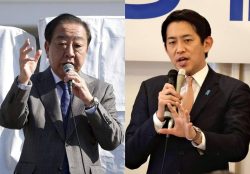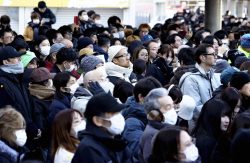Unification Church: Dissolution Order Acknowledges Severely Harmful Nature of Donations
15:26 JST, March 26, 2025
Freedom of religious activities should be respected. However, an approach to collecting donations that appears to take advantage of religious beliefs and unreasonably deprive followers of their assets can never be acceptable. This judicial decision can be said to be appropriate.
The Tokyo District Court has ordered the dissolution of the Unification Church, formally called the Family Federation for World Peace and Unification. The Education, Culture, Sports, Science and Technology Ministry petitioned the court in 2023 for an order to dissolve the religious group, as there has been no end to the troubles involving former followers over large donations to the group.
The decision stated that “the illegal solicitation of donations has been conducted nationwide for 40 years, causing damage on an unprecedented scale.” Based on that, it criticized the group for “not taking fundamental measures.”
It is likely that the court took a serious look at the fact that the Unification Church continues to have an organizational culture of systematically collecting unreasonable donations and it judged that the group should not be allowed to continue as a religious corporation.
The focus of the trial was whether illegal activities under the Civil Code constituted a requirement for a dissolution order. The Religious Corporations Law stipulates that a religious corporation may be ordered to dissolve if it commits an act that is clearly found to substantially harm public welfare in violation of laws and regulations.
In the past, there were only two examples in which a religious corporation was ordered to be dissolved for violating laws and regulations, including the Aum Supreme Truth cult, and in both cases emphasis was placed on the fact that they had committed serious crimes. In contrast, the Unification Church had not committed any criminal offenses.
The district court’s decision is a significant judgment, indicating that infringement on people’s rights and other concerns can also lead to an order to dissolve a religious corporation.
The decision also noted that the group’s illegal solicitation of donations was “generally harmful and has caused serious disruption to the maintenance of the lives of the individuals and their close relatives.”
According to a lawyers’ group that deals with the damage, more than 190 people have been victimized by making large donations to the group and other activities, with the amount of damage reaching more than ¥5 billion. Some former followers sold their homes to make donations, and others were forced to sign a memorandum that said they would not ask for refunds.
The Unification Church intends to file a complaint over the district court’s decision. The trial is expected to be further protracted. In the meantime, there is concern that the group’s assets could be taken overseas. The government should strengthen its surveillance of the Unification Church, including its affiliated organizations.
The issue of donations to the group gained attention in the wake of the fatal shooting of former Prime Minister Shinzo Abe, and a new law came into effect in 2023 to prohibit the harmful solicitation of donations. What is important is to prevent similar problems from happening again, including at other religious organizations.
The trial was held behind closed doors. The government said it submitted a vast amount of evidence, but it has not disclosed the content of that evidence. This is an important trial concerning freedom of religion. It is essential that the details of the hearings be made clear.
(From The Yomiuri Shimbun, March 26, 2025)
Top Articles in Editorial & Columns
-

40 Million Foreign Visitors to Japan: Urgent Measures Should Be Implemented to Tackle Overtourism
-

University of Tokyo Professor Arrested: Serious Lack of Ethical Sense, Failure of Institutional Governance
-

Defense Spending Set to Top ¥9 Trillion: Vigilant Monitoring of Western Pacific Is Needed
-

AI, Initially a Tool, is Evolving into a Partner – But is it a Good One?
-

Greenland: U.S. Territorial Ambitions Are Anachronistic
JN ACCESS RANKING
-

Univ. in Japan, Tokyo-Based Startup to Develop Satellite for Disaster Prevention Measures, Bears
-

JAL, ANA Cancel Flights During 3-day Holiday Weekend due to Blizzard
-

Japan Institute to Use Domestic Commercial Optical Lattice Clock to Set Japan Standard Time
-

China Eyes Rare Earth Foothold in Malaysia to Maintain Dominance, Counter Japan, U.S.
-

Man Infected with Measles May Have Come in Contact with Many People in Tokyo, Went to Store, Restaurant Around When Symptoms Emerged


















